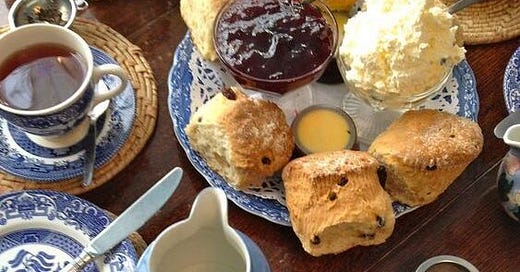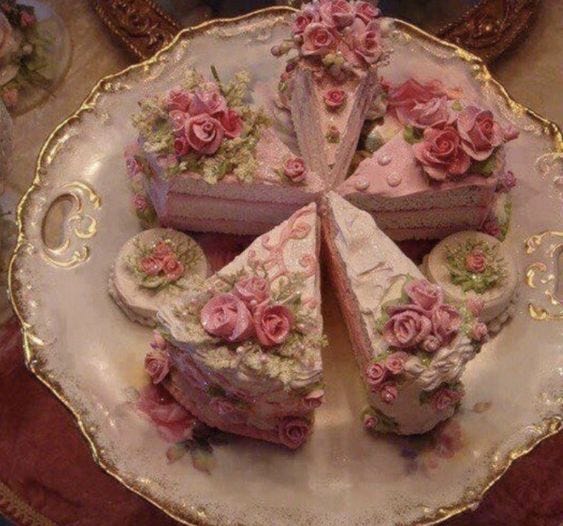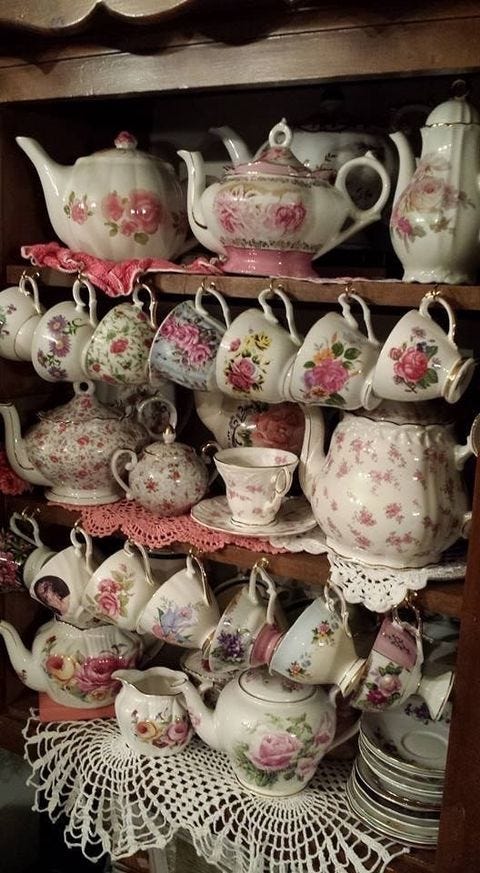A Look Back On | My First Waitressing Job
A post from the archives on stealing desserts and company time
I’m taking a break from posting something new this week as I still have a podcast episode to finish (it will be out next week!), and life and work have been busy. If you have been following my novel journey, you know I’m about to start one more revision before starting to query in May. I’m sure there will be an update on that this month because I have a lot of feelings!
Anyway, this essay was originally published in June of 2023, and it was very fun for me to write. Thinking about all the company time I have stolen over the years to get my writing done or to launch Write or Die has got to amount to a full-time career at this point. And despite talking about waitressing all the time (and writing about it), I was very reluctant to enter the service industry, as you will read here.
This essay is about stealing pastries, crazy bosses and writing in the margins. Thank you for reading.

The first restaurant I ever worked in was a tearoom. As a Cape Cod historic landmark that had been passed down to six different families since the 1860s, it was an old building that creaked and swelled in the summer months, next door to the yellow colonial that the owners lived in. It was a charming spot and a tourist favorite, Greyhound buses shipping in hordes of old ladies in lanyards and practical traveling shoes who fawned over the gift shop’s delicate teacups, dusty bottles of Ribena, and tins of loose Harney and Son’s tea. My job was to man the gift shop, standing behind an illuminated display case of hearty pastries with names reminiscent of London landmarks like the Trafalgar Square (a cheesecake brownie) and the Piccadilly (another brownie with mint buttercream frosting). I was also the hostess, taking reservations and leading customers up the stairs into the tearoom where they had the choice to sit in the newly renovated section, bright and airy with windows, or the original section that some said felt cozy but to me, just glowed an unsettling brown from the reflection of the room next to it and the glossy polyethylene walls.
A couple technically owned the tearoom, but it was Agnes, the wife, who was the caption of the ship. She had her own corner of the kitchen where she made scones and mixed berry pies all day, and often when I had to go back there to bring her the phone or ask a reservation question, she was staring out a tiny window in a trance with her long fingers in a wad of dough. Her husband, Bill, drove a lot of different places in his Escalade; his comings and goings meant to seem deliberate as he marched through the gift shop, but I always thought he just wanted to be somewhere else.
*
If you want to know what kind of woman Agnes was, let me tell you. Once, one of the waiters, when setting up the restaurant dessert display station, found a misshaped lemon square, the fluorescent curd topping dented from fingers or from its sixth day in a row on display. It was too ugly to serve, so he figured he could eat it instead. When Agnes came into the kitchen, her eyes widened at the sight of that sad little lemon square with a corner missing and a fork resting on the lip of the plate. She understood the waiter’s intention to eat it and so she waited for him to leave the kitchen before throwing it in the trash.
One of my unspoken responsibilities as hostesses, since I was stationed in the front of the building, was to alert the kitchen at the precise moment Agnes and Bill drove away for their early evening dinner reservation at the Daniel Webster Inn, so that we could raid the fridge of leftovers, shoving the stale cubes of brownies and raspberry squares left over from afternoon tea into our mouths, strategically scooping cranberry chicken salad from the bowl so there weren’t any obvious spoon marks. While she was there, we were only allowed to eat ham and cheese sandwiches, the cheapest thing on the menu, and even still, she acted as though we were taking money right out of her wallet with every mustardy bite.
I don’t know if it was because of her attitude toward the food or my reckless sugar addiction, but I became something of a klepto back then. The torture of standing in front of freshly baked scones and pastries all day got to me, and whenever Agnes left, I shoved sugary delights into pastry bags, burying them at the bottom of my purse to eat in desperate mouthfuls on my way home. I kept telling myself I would stop, that I shouldn’t be stealing, but that display case wasn’t going anywhere, and I became a person who would find loose chocolate chips in their purse on their days off.
I swore I’d never be a waitress. It seemed like something I couldn’t do—so many things to keep track of, so much of Agnes to deal with. The restaurant was only open from 11-5, amazing hours now that I look back and the waitresses did pretty well in tips considering the amount of out of towners who visited and didn’t understand the tipping system. But I didn’t mind being a host. I wore cute little dresses and pretended to clean the gift shop when Agnes was around. I actually learned a lot about tea, its different leaves and variations, and remedies. We didn’t have a computer, and the wait staff had to write out their bill on lined, old school server paper, handing it to me to ring them in on a cash register. I kept a box of their split tips, and listened to their complaints as they wrote out their bills on the banister above the cash register, me looking up as they scribbled. One waitress had been there for twenty years and had days of being able to tune Agnes out and others where she would hand me her receipts with tears in her eyes.
I became a waitress accidentally. We were understaffed one day, an influx of tourists. I had to help out with tables. I had to run chicken salads and afternoon tea trays, and crumpet melts, wrap teapots in patterned cozies to keep them warm. I actually didn’t mind it. It wasn’t as hard as I thought. When the servers handed me my portion of the cash, I realized I wanted in. Money will do that. Suddenly the impossible was possible, and I decided why yes, I could work for tips. I shed the dresses, strapped on an apron, and became a waitress the following week.
I’m a big advocate for writing on the job. If you are able, it’s a great way to feel like you are getting paid to write. I wrote the first draft of my novel on weekday mornings, logging on to my remote job at the last possible second. If there were any lulls in work, I ignored my inbox and wrote. I created and fostered Write or Die magazine mostly on company time, so much so that I’m pretty sure it was the reason I got laid off last year. (Read about that here.)
As a host at the tearoom, I brought my journal to work. On a weekday morning, when I had already dusted the porcelain tea kettles and refreshed the desserts, and Windexed the display case, when the restaurant was still empty or sparse, I’d pull out my notebook and write. I wrote short stories without ending, the beginnings of things I never finished. Just playing around. I journaled about my life a lot, freshly twenty-one and going to bars every and all weekend with friends, drunkenly making out in parking lots, and living for the dance floor. My life felt exciting and dramatic and like things were happening to me when I was writing these entries, even in that dull old tearoom. Sometimes I wrote while nursing a hangover, a hot Styrofoam cup of milky Darjeeling with honey at my side, suffering through 107.5 FM blasting on the shop radio, classical music that left me wired and anxious. It was another reason to wait for Bill’s Escalade to pull out of the driveway so I could leave my post and rip the radio plug from the wall.
With all my vigilance experience, I knew the sound of Agnes’s footsteps coming from the kitchen and could usually ditch the journal as quickly as I swiped the brownies. But on a few occasions, she caught me, and I received her signature wide-eyed stare, which felt like little cigarette burns poking holes in me. It was such an unsettling look, one that I felt even when she finally blinked, and her eyes shrunk back to their regular size. She then would look around and try to come up with a task she could set me on, one of those bosses who were absolutely appalled by stillness. I would usually end up having to rearrange the same teapot display that I set up the day before.
That feeling of being compelled to write has never gone away, and I can trace the first time I realized that to this tearoom job. Risking Agnes’ wrath to get my feelings down, to scribble in a notebook, to write a few lines that popped into my head while I was wiping down menus. I had no real direction then, but still, writing was a constant. Now, with two novel drafts under my belt and halfway through a third, these moments feel exhilarating. The ones that have you dropping the dishes, you are mid-way through washing to jot down a note about your novel characters, that have you repeating a line out loud until you can unlock your phone and type it into your notes app. Like a sugar rush, these creative moments are quick and desperate.
I have compared novel writing to waitressing before, and just like I thought I couldn’t handle waiting tables at the tearoom, I’ve had many, many moments of feeling the same way about this book. How do I keep track of everything? How do I deliver? How do I keep up the momentum?
Every week is a new challenge, but that compulsion is there—that drive, that need to risk in order to make my art, even if that sometimes means shirking my responsibilities. It feels worth it. It’s addictive—grabbing moments to write like freshly baked scones and shoving them into my mouth.






I loved all the details in this piece, Kailey. There's such an interesting tension between this tea room as a place of decadence and abundance, and the owner, so rigid and stingy (and cruel, by the sounds of it!). And from that friction came your writing!
I love this reflection (also, I used to live around the corner from the tea room you’re describing 🤣)